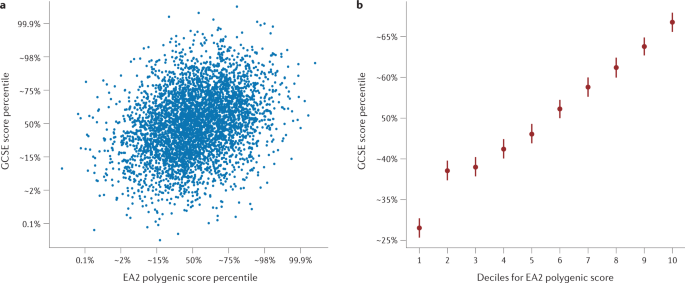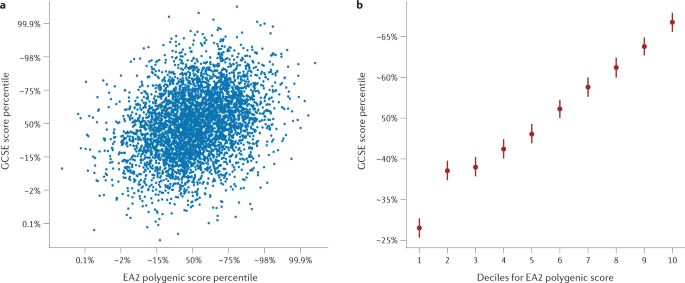
Parens, E. The inflated promise of genomic medicine. Scientific American https://blogs.scientificamerican.com/observations/the-inflated-promise-of-genomic-medicine/ (2020).
Panofsky, A. Misbehaving Science (Univ. of Chicago Press, 2014).
Polderman, T. J. C. et al. Meta-analysis of the heritability of human traits based on fifty years of twin studies. Nat. Genet. 47, 702–709 (2015).
Jensen, A. How much can we boost IQ and scholastic achievement. Harv. Educ. Rev. 39, 1–123 (1969).
Murray, C. Human Diversity: The Biology of Gender, Race, and Class (Twelve, 2020).
Belsky, D. W. & Harden, K. P. Phenotypic annotation: using polygenic scores to translate discoveries from genome-wide association studies from the top down. Curr. Dir. Psychol. Sci. 28, 82–90 (2019).
Visscher, P. M. et al. 10 years of GWAS discovery: biology, function, and translation. Am. J. Hum. Genet. 101, 5–22 (2017).
Martschenko, D. O., Domingue, B. W., Matthews, L. J. & Trejo, S. FoGS provides a public FAQ repository for social and behavioral genomic discoveries. Nat. Genet. 53, 1272–1274 (2021).
Freese, J. The arrival of social science genomics. Contemp. Sociol. 47, 524–536 (2018).
Salganik, M. J. et al. Measuring the predictability of life outcomes with a scientific mass collaboration. Peoc. Natl Acad. Sci. USA 117, 8398–8403 (2020).
Okbay, A. et al. Polygenic prediction of educational attainment within and between families from genome-wide association analyses in 3 million individuals. Nat. Genet. 1–13 https://doi.org/10.1038/s41588-022-01016-z (2022).
Comfort, N. Genetic determinism rides again. Nature 561, 461–463 (2018).
Hoefer, C. Causal determinism. The Stanford Encyclopedia of Philosophy (Spring 2016 Edition), Edward N. Zalta (ed.), https://plato.stanford.edu/archives/spr2016/entries/determinism-causal (2016).
Block, N. How heritability misleads about race. Cognition 56, 99–128 (1995).
Woodward, J. Causation in biology: stability, specificity, and the choice of levels of explanation. Biol. Philos. 25, 287–318 (2010).
McKusick, V. A. Ellis–van Creveld syndrome and the Amish. Nat. Genet. 24, 203–204 (2000).
Kendler, K. S. “A gene for …”: the nature of gene action in psychiatric disorders. AJP 162, 1243–1252 (2005).
Visscher, P. M., Hill, W. G. & Wray, N. R. Heritability in the genomics era — concepts and misconceptions. Nat. Rev. Genet. 9, 255–266 (2008).
Heath, A. C. et al. Education policy and the heritability of educational attainment. Nature 314, 734–736 (1985).
Burgoyne, A. P. et al. Can a brief intervention alter genetic and environmental influences on psychological traits? An experimental behavioral genetics approach. Learn. Motiv. 72, 101683 (2020).
Raffington, L. et al. An in-laboratory stressor reveals unique genetic variation in child cortisol output. Dev. Psychol. https://doi.org/10.1037/dev0001393 (2022).
Madole, J. W. & Harden, K. P. Building causal knowledge in behavior genetics. Behav. Brain Sci. 1–76 https://doi.org/10.1017/S0140525X22000681 (2022).
Williams, S. C. P. Genes don’t just influence your IQ — they determine how well you do in school. Science https://doi.org/10.1126/article.22329 (2014).
Regalado, A. Forecasts of genetic fate just got a lot more accurate. MIT Technology Review https://www.technologyreview.com/2018/02/21/241168/forecasts-of-genetic-fate-just-got-a-lot-more-accurate/ (2018).
Herd, P. et al. Genes, gender inequality, and educational attainment. Am. Sociol. Rev. 84, 1069–1098 (2019).
Plomin, R. & von Stumm, S. The new genetics of intelligence. Nat. Rev. Genet. 19, 148–159 (2018).
Weissgerber, T. L., Milic, N. M., Winham, S. J. & Garovic, V. D. Beyond bar and line graphs: time for a new data presentation paradigm. PLoS Biol. 13, e1002128 (2015).
Kevles, D. J. In the Name of Eugenics: Genetics and the Uses of Human Heredity (Harvard Univ. Press, 1998).
Wedow, R., Martschenko, D. O. & Trejo, S. Scientists must consider the risk of racist misappropriation of research. Scientific American https://www.scientificamerican.com/article/scientists-must-consider-the-risk-of-racist-misappropriation-of-research/ (2022).
Hochschild, J. Genomic Politics: How the Revolution in Genomic Science is Shaping American Society (Oxford Univ. Press, 2021).
Shostak, S., Freese, J., Link, B. G. & Phelan, J. C. The politics of the gene: social status and beliefs about genetics for individual outcomes. Soc. Psychol. Q. 72, 77–93 (2009).
Rothwell, J. Experiment shows conservatives more willing to share wealth than they say. New York Times https://www.nytimes.com/2020/02/13/upshot/trump-supporters-experiment-inequality.html (2020).
Willoughby, E. A. et al. Free will, determinism, and intuitive judgments about the heritability of behavior. Behav. Genet. 49, 136–153 (2019).
Carver, R. B., Castéra, J., Gericke, N., Evangelista, N. A. M. & El-Hani, C. N. Young adults’ belief in genetic determinism, and knowledge and attitudes towards modern genetics and genomics: the PUGGS questionnaire. PLoS One 12, e0169808 (2017).
Medin, D. L. & Ortony, A. in Similarity and Analogical Reasoning 179–195 (Cambridge Univ. Press, 1989). https://doi.org/10.1017/CBO9780511529863.009.
Keller, J. In genes we trust: the biological component of psychological essentialism and its relationship to mechanisms of motivated social cognition. J. Pers. Soc. Psychol. 88, 686–702 (2005).
Gelman, S. A. The Essential Child: Origins of Essentialism in Everyday Thought (Oxford Univ. Press, 2005).
Haslam, N., Rothschild, L. & Ernst, D. Essentialist beliefs about social categories. Br. J. Soc. Psychol. 39 (Pt 1), 113–27 (2000).
Tabb, K., Lebowitz, M. S. & Appelbaum, P. S. Behavioral genetics and attributions of moral responsibility. Behav. Genet. https://doi.org/10.1007/s10519-018-9916-0 (2018).
Dar-Nimrod, I. & Heine, S. J. Genetic essentialism: on the deceptive determinism of DNA. Psychol. Bull. 137, 800–818 (2011).
Allport, G. W., Clark, K. & Pettigrew, T. The Nature of Prejudice: 25th Anniversary Edition (Basic Books, 1979).
Mandalaywala, T. M. Does essentialism lead to racial prejudice? It is not so Black and White. Adv. Child. Dev. Behav. 59, 195–245 (2020).
Andreychik, M. R. & Gill, M. J. Do natural kind beliefs about social groups contribute to prejudice? Distinguishing bio-somatic essentialism from bio-behavioral essentialism, and both of these from entitativity. Group. Process. Intergroup Relat. 18, 454–474 (2015).
Mandalaywala, T. M., Amodio, D. M. & Rhodes, M. Essentialism promotes racial prejudice by increasing endorsement of social hierarchies. Soc. Psychol. Personal. Sci. 9, 461–469 (2018).
Dar-Nimrod, I. & Heine, S. J. Exposure to scientific theories affects women’s math performance. Science 314, 435–435 (2006).
Donovan, B. M. et al. Toward a more humane genetics education: learning about the social and quantitative complexities of human genetic variation research could reduce racial bias in adolescent and adult populations. Sci. Educ. 103, 529–560 (2019).
Brescoll, V. L., Uhlmann, E. L. & Newman, G. E. The effects of system-justifying motives on endorsement of essentialist explanations for gender differences. J. Pers. Soc. Psychol. 105, 891–908 (2013).
Bailey, A. & Knobe, J. Biological essentialism correlates with (but doesn’t cause?) intergroup bias. Pers. Soc. Psychol. Bull. https://doi.org/10.31234/osf.io/rx8jc (2022).
Haslam, N. & Levy, S. R. Essentialist beliefs about homosexuality: structure and implications for prejudice. Pers. Soc. Psychol. Bull. 32, 471–485 (2006).
Verkuyten, M. Discourses about ethnic group (de-)essentialism: oppressive and progressive aspects. Br. J. Soc. Psychol. 42, 371–391 (2003).
Carlson, J. & Harris, K. Quantifying and contextualizing the impact of bioRxiv preprints through automated social media audience segmentation. PLoS Biol. 18, e3000860 (2020).
Rosenberg, A. Reductionism in a historical science. Philos. Sci. 68, 135–163 (2001).
Guze, S. B. Biological psychiatry: is there any other kind? Psychol. Med. 19, 315–323 (1989).
Feldman, M. W. & Riskin, J. Why biology is not destiny. The New York Review of Books https://www.nybooks.com/articles/2022/04/21/why-biology-is-not-destiny-genetic-lottery-kathryn-harden/ (2022).
Kendler, K. S. Toward a philosophical structure for psychiatry. Am. J. Psychiatr. 162, 433-440 (2005).
Muszynski, E. & Malaterre, C. A roadmap to explanatory pluralism: introduction to the topical collection The Biology of Behaviour. Synthese 199, 1777–1789 (2021).
Longino, H. E. Studying Human Behavior: How Scientists Investigate Aggression and Sexuality (Univ. of Chicago Press, 2013).
Turkheimer, E. in Levels of Analysis in Psychopathology: Cross-Disciplinary Perspectives (eds. Parnas, J., Kendler, K. S. & Zachar, P.) 521–544 (Cambridge Univ. Press, 2020). https://doi.org/10.1017/9781108750349.046.
Junger, S. Opinion: Our politics are in our DNA. That’s a good thing. Washington Post https://www.washingtonpost.com/opinions/our-politics-are-in-our-dna-thats-a-good-thing/2019/07/05/c4d8579e-984d-11e9-830a-21b9b36b64ad_story.html (2019).
Zimmer, C. Genetic intelligence tests are next to worthless. Atlantic https://www.theatlantic.com/science/archive/2018/05/genetic-intelligence-tests-are-next-to-worthless/561392/ (2018).
Keles, B., McCrae, N. & Grealish, A. A systematic review: the influence of social media on depression, anxiety and psychological distress in adolescents. Int. J. Adolesc. Youth 25, 79–93 (2020).
Jencks, C. Inequality: A Reassessment of the Effect of Family and Schooling in America (Basic Books, 1972).
Demange, P. et al. Investigating the genetic architecture of noncognitive skills using GWAS-by-subtraction. Nat. Genet. 53, 35–44 (2021).
Rogers, A. Star neuroscientist Tom Insel leaves the Google-spawned Verily for … a startup? Wired https://www.wired.com/2017/05/star-neuroscientist-tom-insel-leaves-google-spawned-verily-startup (2017).
Lewis, A. C. F. et al. Getting genetic ancestry right for science and society. Science 376, 250–252 (2022).








